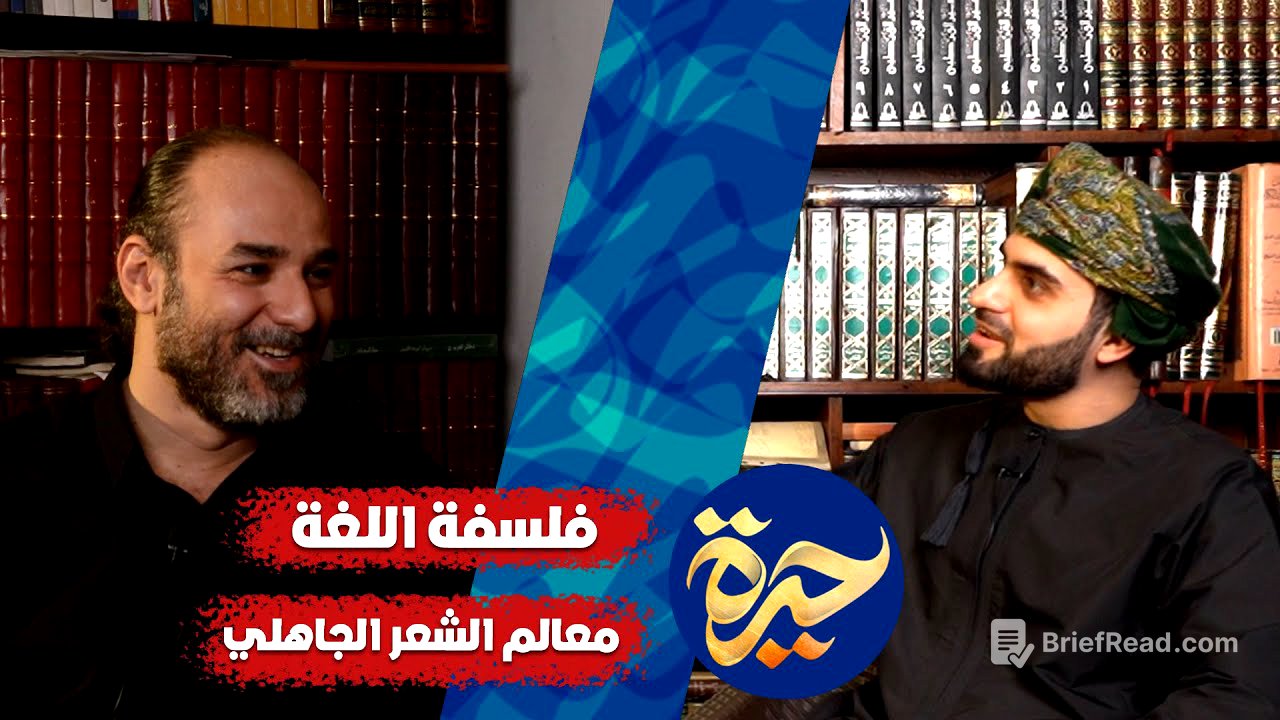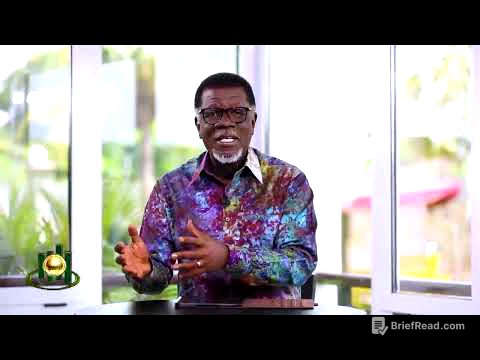TLDR;
This YouTube video features a conversation with Abu Qais Muhammad Rashid, discussing the essence of poetry, the unique characteristics of the Arabic language, and the moral and ethical values of pre-Islamic Arab society. The discussion covers the importance of language in shaping thought, the role of poetry in preserving cultural identity, and the nuances of love, desire, and expression in Arabic literature.
- The Arabic language possesses unique characteristics that shape the way its speakers perceive the world.
- Poetry is the ultimate expression of a language's unique qualities and plays a crucial role in preserving cultural identity.
- Pre-Islamic Arab society had a sophisticated moral code that valued honor, hospitality, and protection of the vulnerable.
- Islam refined and elevated existing virtues while introducing new concepts such as equality and devotion to God.
- Arabic poetry, particularly love poetry, explores the depths of human emotion and the complexities of relationships.
مقتطفات من الحوار [0:00]
The video begins with an introduction to Abu Qais Muhammad Rashid, a scholar of Arabic poetry and literature. The host expresses his admiration for Abu Qais's dedication to poetry and his deep understanding of its philosophy. The conversation starts by exploring the essence of poetry and its significance in life, referencing the idea that a nation that loses its poetry loses itself.
سر تفوّق اللغة العربية [4:07]
The discussion shifts to the unique characteristics of the Arabic language, emphasizing that each language has its own "code" or "equation" for expression. The video references a book titled "Through the Prism of Language: Why the World Looks Different in Other Languages," highlighting how language shapes perception. An example is given of how the Arabic language, through its grammatical structure, conveys a sense of femininity in a verb even before the subject is identified, a nuance that is lost in English. The speaker also touches on the flexibility of Arabic, allowing for multiple ways to express the same idea, each with its own subtle meaning.
فلسفة اللغة وثقافة المجتمع [15:40]
The conversation explores how the Arabic language reflects the culture and values of its speakers. Ibn Jinni's " الخصائص" is mentioned, which discusses how the sounds of Arabic words often mimic the sounds of the events they describe. Examples are provided, such as the word "حطب" (firewood) and "قطم" (to cut something dry), to illustrate this connection. The speaker also discusses how the Quran's unique sound and structure are integral to its meaning and cannot be fully translated into other languages. The purity of the Arabic language in pre-Islamic times is highlighted, as the Bedouins of the Arabian Peninsula preserved its original form.
الذوق الحسي والمعنوي [34:21]
The discussion turns to the concept of "taste" (الذوق) in Arabic culture, both in a literal and metaphorical sense. The speaker explains how the Arabic language uses sensory terms to describe abstract concepts, such as "tasting" the sweetness of a word or feeling the weight of an idea. This reflects the Arab's deep connection to their language and their ability to perceive its beauty and power on a visceral level. The concept of "تلبس" (being possessed by a poem) is introduced, illustrating how deeply Arabic poetry can affect its audience.
الأخلاق والقيم في العصر الجاهلي [46:48]
The video challenges the common portrayal of pre-Islamic Arab society as morally bankrupt. The speaker argues that the Arabs had a sophisticated ethical code that valued honor, hospitality, and protection of the vulnerable. Examples are given of customs such as not killing women, protecting those who seek refuge, and honoring one's word. The speaker references the story of Imru' al-Qais, who, despite seeking revenge for his father's death, upheld the principles of hospitality and honor even towards his enemies.
ما هو التحوّل الذي جاء به الإسلام [1:00:03]
The conversation addresses the transformative impact of Islam on Arab society. While acknowledging the positive values that existed in pre-Islamic times, the speaker emphasizes that Islam brought about a new level of unity, justice, and devotion to God. The speaker highlights the importance of recognizing the genuine advantages that Islam introduced, most notably the concept of monotheism and the emphasis on working for the afterlife. The discussion touches on the Islamic principles of moderation in spending, addressing poverty, and promoting social justice.
بين الحب والغزل والفحش [1:11:29]
The discussion shifts to the topic of love poetry (غزل) in Arabic literature. The speaker defines "غزل" as the expression of longing and desire for the beloved, emphasizing the importance of observing the differences between masculinity and femininity. He distinguishes between "عذري" (platonic) and "غزلي" (sensual) poetry, explaining that "عذري" poetry focuses on the pain of separation and idealizes the beloved, while "غزلي" poetry celebrates the physical beauty and charms of the beloved. The speaker also touches on the role of imagination and fantasy in Arabic love poetry, highlighting the Arab's ability to create a world of beauty and romance around the object of their affection.
أبيات في الغزل الجاهلي [1:34:24]
The speaker shares some of his favorite verses from Arabic love poetry, including lines from his book "تذكرت ليلى" (I Remembered Layla). He analyzes the imagery and metaphors used by the poets, highlighting their ability to convey deep emotions and create vivid scenes. The speaker also discusses the importance of "الحس" (sense) in Arabic poetry, explaining how the poet's keen perception of the world around them informs their work.
شعر رثاء أهل البيت (ع) [1:39:31]
The conversation turns to the poetry of mourning (رثاء) for the Ahl al-Bayt (the family of the Prophet Muhammad). The speaker discusses the cultural and religious significance of this genre, particularly among Shia Muslims. He explains that the commemoration of the martyrdom of the Ahl al-Bayt is a central part of Shia identity and that poetry plays a crucial role in preserving and transmitting this tradition. The speaker mentions prominent poets such as al-Farazdaq, al-Kumait al-Asadi, and Di'bil al-Khuza'i, whose works are considered essential to this genre.
تأملات في المشروع الأدبي والشعري [1:48:49]
The video concludes with a discussion of the speaker's future plans and his views on contemporary Arabic poetry. He expresses his commitment to traveling and meeting with people to promote the appreciation of Arabic literature. The speaker criticizes modern poetry for its perceived superficiality and linguistic corruption, arguing that it deviates from the traditional values of Arabic poetry. He announces his intention to write a book critiquing Adonis's "الثابت والمتحول" (The Fixed and the Changing), arguing that Adonis's work is fundamentally flawed in its understanding of the Arabic language and its literary tradition. The speaker concludes by emphasizing the importance of preserving the unique qualities of Arabic poetry and promoting a deeper understanding of its rich heritage.









